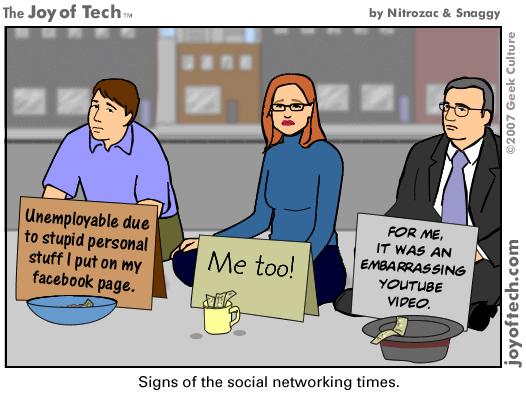I’m puzzling over the recent brouhaha regarding Facebook’s changes to their privacy policy. To be clear: I’m not puzzling over the changes (though they are confusing to the user who just wants to use the service instead of thinking about its internal minutia) – I’m puzzling over the concern about them.
 Blogs are 100% public. Twitter is 100% public. Posting on newsgroups and forums is 100% public. The web in general is a public space. I’m wondering WHY there are such dramatically different expectations on Facebook than everywhere else. Fine-grained control over exactly who gets to see exactly what? All of this comes down to a single problem: Millions of people apparently want to have a web presence and yet be private at the same time. Everywhere else online, it’s one or the other.
Blogs are 100% public. Twitter is 100% public. Posting on newsgroups and forums is 100% public. The web in general is a public space. I’m wondering WHY there are such dramatically different expectations on Facebook than everywhere else. Fine-grained control over exactly who gets to see exactly what? All of this comes down to a single problem: Millions of people apparently want to have a web presence and yet be private at the same time. Everywhere else online, it’s one or the other.
For me, it’s simple: If what you have to say shouldn’t be said to the whole world, then don’t say it online. In other words, the basic assumption is wrong to begin with. Facebook is trying to give you the sense that you can post online and control your privacy at the same time. It doesn’t work.
Actually, this problem isn’t limited to the web. When you walk down the street, you’re on public display. You don’t pick your nose in public because… well, you just don’t. You don’t need to be told that that’s something you do in private. If you have something private to say to someone, you whisper in their ear, or you call them. Or you email them. Don’t post it where others can see it.
The idea that I should be able to play online but not have to worry that my thoughts are completely public just seems… unrealistic. How many stories have you read about people being fired or worse over comments they’ve made on Facebook? Did their privacy settings protect them? No – things get out. The problem is not Facebook’s new privacy settings, but an epidemic of oversharing. It’s a problem that should be solved the same way we solve it in the real world – by being discrete – not by adding more dials and levers to our interactions.

Then there’s the question of reach. In general, people want to be heard. They pay close attention to the number of Facebook Friends or Twitter followers they currently have. Bloggers watch their traffic logs obsessively. Why? Because they want their thoughts to be heard as widely as possible. Guess what gives your thoughts the widest possible reach? Completely open platforms with no concept of privacy, like Twitter, blogs, and forums. In those spaces, it’s up to the user not to broadcast things they don’t want the whole world to see.
I’m personally glad that Facebook is gradually nudging users to share more content publicly, putting the brakes on this expectation that people can post online but not be public. When was the last time a Facebook post showed up in your Google search results? OK granted, I wouldn’t want most Facebook posts polluting my search results (there’s a whole lot of noise out there), but there’s also a lot of great content locked away behind the “privacy” firewall that really should be part of the public web — which is built on concepts of openness and transparency.
The fact that only people who “friend” me can see my content on Facebook is an annoyance to me, not a feature I cherish and wring my hands over. My dream “privacy” preference for Facebook would be a simple checkbox option reading “I acknowledge that I’m writing stuff on the web. Treat my content as such.”
Update 01/04: In an interview in front of a live audience, Facebook founder Mark Zuckerberg says if he were starting all over again, he’d make everyone’s information public. Because that is the “social norm.”

I’m with you as far as “if you don’t want the world to know, don’t put it on the internet”. However, for me, the concern over Facebook’s privacy changes is that they are taking something that was previously not accessible, and making it public. So it’s an expectation change. Yesterday, I posted to Facebook and someone searching on Google couldn’t find it. Today, the stuff I posted yesterday is public. Yikes!
People will get over it (they always do). Eventually, social networking sites will develop (or become more visible) where the expectation of privacy within the walls of the site is backed by some sort of contract and perhaps money spent by the users. Because, really, if we want free services, how can we complain when the company providing the service decides to make money selling our content?
I have to say I’m torn on this one. On allot of levels I agree with you, people should be smart enough to be able to censor themselves. Point blank… if you post on line expect people to read it.
On another level though I think that a big part of why facebook caught on and is successful is due to the fact that its so locked down. In the beginning it was the exclusive to college kids so people were hungry to get in. The old velvet rope approach gets them every time(just ask google). Once they started letting everyone join I think a lot of the draw was that you could restrict who looked at your profile. People were sick of being e-stalked on myspace.
Now that being said as a web developer and someone who writes a lot of facebook applications (for work) I find the privacy restrictions to be quite a pain. I get why they do it but it makes my life hell. And their only making it harder on us (don’t get me started on how often they change/deprecate their api calls).
Long story short I agree with you but I get why they do what they do. :)
Teenage daughters. Got two of them. They keep up with their many friends exchanging photos, stories, and comments on Facebook. It is a great way for them to all keep in touch with one another. Parents followed. Aunts and uncles followed. Then grandparents and their friends.
There is no reason to extend it beyond the tens or hundreds. Certainly don’t need exposure to predators. That was what FaceBook offered over MySpace for a group of users who are not comfortable with being in front of the world.
I heard one family member describe Facebook as an extension of the living room. That’s useful, but requires some level of privacy. Facebook privacy is as important to us as the locks on our front doors.
Jeb, that’s a very solid argument. Kind of parallel to the one on anonymity/pseudonyms vs. real names on the internet. I feel like the popularity of using handles or fake names in general is not good, *except* in the case of political dissidents and teenage girls, where anonymity is a real strength. Thanks for pointing it out.
Ars has a rundown on the Facebook privacy updates.
There is a level of friendliness that must take place when you’re on facebook or any social platfom, but with some discretion. I think that there should be guidelines outlined, but its up to you to know what you are posting on your facebook page. Would you be comfortable with even one person you don’t know so well seeing what you wrote? If the answer is yes, then you should probably talk about something else. You don’t have to share everything to connect with people on the web.
Kay – I’ve removed the spammy link to your diet enterprise that you had included in your initial comment, but posted the comment itself.
That kind of begs the question. My whole point is that that’s how the web works – things shouldn’t go on the web that one isn’t comfortable being fully public (with some understandable exceptions, as mentioned above).